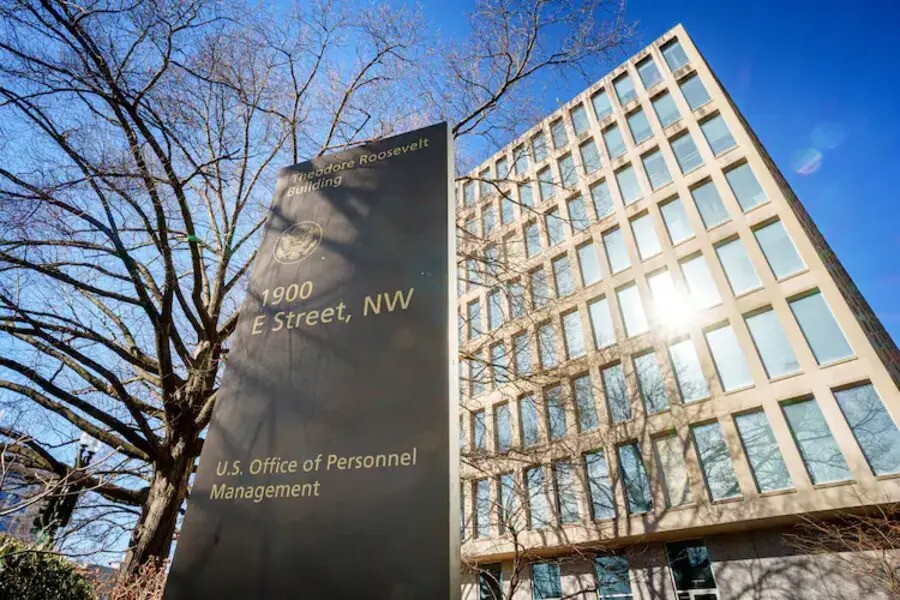Federal workers across multiple government agencies received a surprising email this week offering them full pay and benefits through September 30, 2025, if they choose to resign by February 6. The offer, issued by the White House’s Office of Personnel Management (OPM), has led to widespread confusion and concern about its legality and intent.
Many employees initially believed the email, titled “A Fork in the Road,” was a phishing scam due to its unusual language and vague details. The memo reassured recipients that they could “stay at home and relax or travel to their dream destination.” This raised further suspicion as employees questioned how such an offer could be possible when Congress controls federal spending.
The legality of the offer has been challenged by employment lawyers, who argue that the executive branch cannot authorize pay without congressional approval. Complicating the situation, many federal agencies are expected to run out of funding by March, casting doubt on how the government would continue to pay those who resign.
To address the skepticism, senior officials from various departments sent follow-up memos to their staff on Friday, confirming that the offers were legitimate. One memo, signed by Kailee Tkacz Buller, chief of staff at the U.S. Department of Agriculture (USDA), stated:
“On behalf of the United States Department of Agriculture, I am informing you that the offer is valid, lawful, and will be honored by USDA. If you accept the deferred resignation offer, you will receive pay and benefits through September 30, 2025, and will not be subject to a reduction-in-force or other premature separation.”
Despite these reassurances, federal worker unions have expressed serious concerns about the lack of clarity and legal backing. Max Alonzo, national secretary-treasurer for the National Federation of Federal Employees (NFFE), urged workers not to accept the offer, warning of potential risks.
“Do not resign,” Alonzo said. “There’s nothing that says they have to pay you until September 30. There’s no contract, no regulations, and no congressional authorization. We don’t even know if this is legal. This has never been done before.”
Alonzo warned that employees who resign could be left without pay or benefits if the government does not follow through on its promises.
Federal workers who received the email have also questioned the timing and motivation behind the offer. Some speculate that it is part of President Donald Trump’s broader plan to reduce the size of the federal workforce. On his first day back in office, Trump signed an executive order to end teleworking for federal employees, calling for a return to in-person work.
The resignation offer, however, was not limited to teleworkers. It was sent to employees in critical roles, including U.S. Forest Service firefighters and Department of Veterans Affairs nurses, who are required to work on-site. Many of these employees remain skeptical about how the offer applies to their positions.
When asked about the buyout initiative during a press conference on Friday, Trump was candid about the administration’s goals.
“We’d love to have them leave,” Trump said. “We’re trying to reduce government.”
Trump did not provide details on how many employees had accepted the offer but suggested that more information would be available after the February 6 deadline.
“Nobody knows how that’s going to turn out,” Trump said. “Everybody’s replaceable, and we’ll get very good people to replace them if it turns out to be more than we thought it could be.”
The initiative has sparked backlash from lawmakers, unions, and legal experts. Critics argue that the move could lead to staffing shortages in essential services, including disaster response, healthcare, and national security. Senator Mark Warner, vice chairman of the Senate Intelligence Committee, expressed alarm at the potential consequences.
“At a time when we face serious threats from terrorism, drug trafficking, and espionage, it is deeply concerning that the administration is pushing experienced federal employees out the door,” Warner said.
Senator Dick Durbin, the ranking Democrat on the Judiciary Committee, also criticized the move, warning that it could weaken the integrity of government operations.
“President Trump wants a federal workforce filled with loyalists instead of experienced professionals,” Durbin said. “This is a reckless and dangerous approach to governing.”
Employment lawyers are now analyzing the legality of the buyout offer. Without congressional approval, many experts believe the executive branch does not have the authority to promise long-term pay for resigning employees. Others suggest that the administration may be relying on discretionary funds from other sources, though this raises additional questions about transparency and oversight.
For many federal workers, the offer presents a dilemma. While some are tempted by the opportunity to receive pay without working, others fear the risk of losing their benefits or being left unpaid if Congress does not authorize the funds.
“It’s a gamble,” said one anonymous federal employee. “Do you trust that they’ll pay you through September, or do you stay and risk getting laid off with nothing?”
Union leaders are advising employees to seek legal advice before making any decisions. They are also calling for congressional oversight to ensure that workers are not misled or exploited by the administration’s offer.
As the February 6 deadline approaches, the controversy surrounding the buyout offer is expected to intensify. The situation has already become a major topic of discussion among federal employees, legal experts, and lawmakers. Many are watching closely to see how the administration handles the fallout and whether further actions will be taken to reduce the federal workforce.
For now, federal workers remain at a crossroads, unsure of what the future holds. The title of the memo, “A Fork in the Road,” seems fitting—employees must choose between uncertainty and risk, with no clear path ahead.

